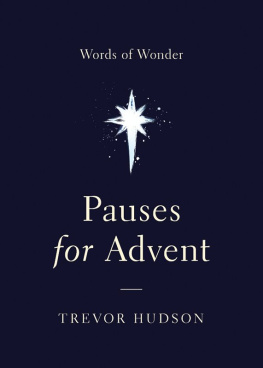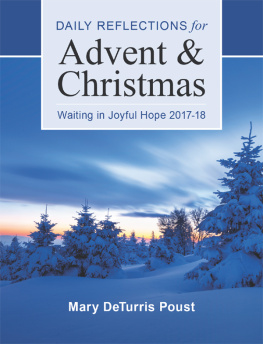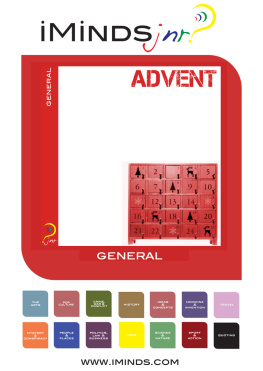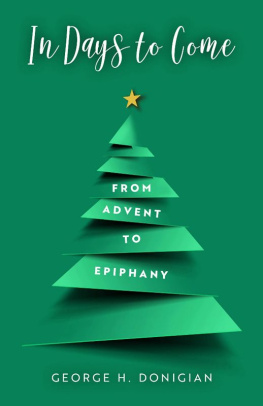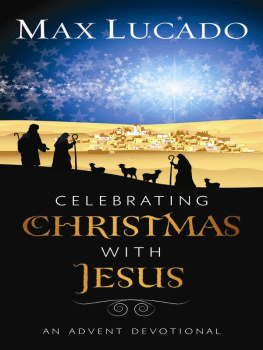Contents
First Week of Advent
Second Week of Advent
Third Week of Advent
Fourth Week of Advent
P AUSES FOR A DVENT : Words of Wonder
Copyright 2017 by Trevor Hudson
All rights reserved.
No part of this book may be reproduced in any manner whatsoever without permission except for brief quotations in critical articles or reviews. For information, write Upper Room Books, 1908 Grand Avenue, Nashville, TN 37212.
Upper Room Books website: books.upperroom.org
Upper Room, Upper Room Books, and design logos are trademarks owned by The Upper Room, Nashville, Tennessee. All rights reserved.
Scripture quotations not otherwise noted are from the New Revised Standard Version Bible, copyright 1989 National Council of the Churches of Christ in the United States of America. Used by permission. All rights reserved.
Cover design, illustration, and interior design: Faceout Studio
Cover image:: Shutterstock
Library of Congress Cataloging-in-Publication Data
Names: Hudson, Trevor, 1951 author.
Title: Pauses for Advent : words of wonder / Trevor Hudson.
Description: Nashville : Upper Room Books, 2017. |
Identifiers: LCCN 2016056669 (print) | LCCN 2017027255 (ebook) | ISBN 9780835817110 (Mobi) | ISBN 9780835817127 (Epub) | ISBN 9780835817103 (print)
Subjects: LCSH: AdventMeditations.
Classification: LCC BV40 (ebook) | LCC BV40 .H83 2017 (print) | DDC
242/.332dc23
LC record available at https://lccn.loc.gov/2016056669
Read Matthew 3:1-12.
I baptize you with water for repentance, but one who is more powerful than I is coming after me.... He will baptize you with the Holy Spirit and fire.
Matthew 3:11
Even though our first impressions of John the Baptist are a bit scary, I find him to be intriguing. Dressed in camels hair with a leather belt around his waist, John the Baptist eats locusts and wild honey. He wanders in lonely desert spaces and preaches an uncompromising message about laying an ax to the root of the tree; he even calls his audience a brood of snakes. He plunges people into the Jordan River as a sign of their repentance. But behind his austere garb, rigorous diet, harsh locale, and radical message, we see his self-effacing humility, making him the divinely chosen prophet through whom the Messiah is revealed.
How do we practice this kind of humility so that Jesus presence may shine through our lives? As soon as we think we are making progress on the path toward humility, we become self-righteous and proud. We start to think that those around us are not quite as humble as they should be. We compare ourselves to others and think that we are more humble than they are. Before we realize it, we find ourselves in a place far removed from where we set out to be. So what can we learn from John the Baptist about genuine humility?
First, John speaks unashamedly and without pretense about the One who would be coming after him. He possesses a clear sense of his secondary role in Gods salvation story. He knows he has a voice, but he is not the Word. His actions present us with a challenge. At an early age, we learn to carry ourselves in certain ways to get what we want. We manipulate the truth about ourselves in order to look more important than we really are. We give the impression that we are essential in certain situations even when we arent. We step onto the path of genuine humility when we give up these attempts at pretending and show our true selves.
Second, John seeks to serve those around him. He does so through the message he preaches and the baptisms he performs. Humility grows in our lives as we discipline ourselves to serve others quietly and without expecting fanfare. Opportunities to act with humility present themselves every day. We can offer a ride on a rainy day to a colleague who usually walks. We can take an interest in someone who cannot enhance our reputation. We can take out the garbage without being asked. Small acts of service like these go a long way in training our habits so that we no longer act out of self-importance and pride.
Third, and most importantly, John consistently points others toward the Messiah and away from himself. John informs his followers that he can only baptize with water; Jesus will baptize with the Holy Spirit and fire. John does not seek to grab the limelight. He willingly puts himself second so that Jesus can come first. This is not always easy for us. We want to be known, to be recognized, and to feel important. When we take center stage, either in our own lives or in the lives of others, Jesus light grows dim, and our lives fail to reveal him to those around us.
Epiphany invites us to get to know John the Baptist. As we allow him to mentor us along the path toward genuine humility, Jesus light will begin to shine more brightly through us and into the world.
Daily Practice
Experiment with John the Baptists recipe for humility. For twenty-four hours, seek authenticity by avoiding pretense and eschewing the limelight. At the end of your experiment, reflect on your experiences and ask God for guidance.
After almost forty years in pastoral ministry, I have noticed a few things about how people experience Christmas. On one hand, they yearn to celebrate the mystery of the season in a way that is meaningful, significant, and even transformative. On the other hand, they reach Christmas Day feeling unprepared and unready. Shopping, finalizing holiday plans to visit friends and family, and decorating their homes gobble up the days preceding Christmas and fill them with anxiety. Christmas Day arrives, and they have not observed Advent the way they intended. Consequently, their celebration of the Christ child on Christmas Day lacks a sense of wonder.
In this little book, I want to respond to the widespread yearning for a more wondrous experience of Christmas. The Christian calendar is shaped by different seasons. These seasons are time gifts that the church gives us to participate more deeply in what God has done and is doing in the world. Beginning with Advent (the start of the Christian year), we receive the opportunity to enter into the mystery of Jesus birth. Lent, a season consisting of forty days, prepares us to participate in the death and resurrection of Jesus. Ascension reminds us that Christs presence fills the universe, while Pentecost invites us to open our lives to the presence of the Holy Spirit. Each season represents a vital part Gods story. Each one needs to be observed thoughtfully, deliberately, and intentionally. When we dont, our spiritual journey becomes impoverished, lopsided, and one-dimensional.
So how can we fill the season of Advent with more wonder? As Tom Wright, the distinguished New Testament scholar, reminds us, if we remove Adventthat is, attentively waiting for Jesus birthfrom the Bible, we lose half the Old Testament and most of the New, including stories of Jesus ancestors, the words of the prophets, and the mystery of the Incarnation. Most certainly, if we dont observe Advent thoughtfully, we will not arrive at Christmas ready for the Christ child. We will come to that special day not too sure what the fuss is all about. But if we embrace Adventthis special time of anticipating the mystery of the Incarnationwe will find our celebration of Jesus coming at Bethlehem filled with wonder and awe.
What is Advent all about? Built around the four Sundays leading up to Christmas Day, Advent provides us with time for preparation. We seek to prepare for the coming of Jesuswho has come in the past, who continually comes in the present, and who will come in the future. During Advent, we pray with our heart and mind, Come, Lord Jesus, come . Along with this prayer of deep longing and yearning, we wait and watch, we remember and repent, we believe and behold. Above all, we seek to stay awake and become aware. Jesus often enters our lives in quiet, hidden, and unexpected ways.
Next page
